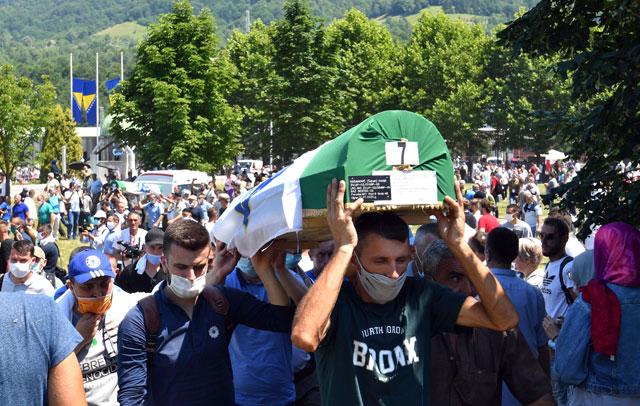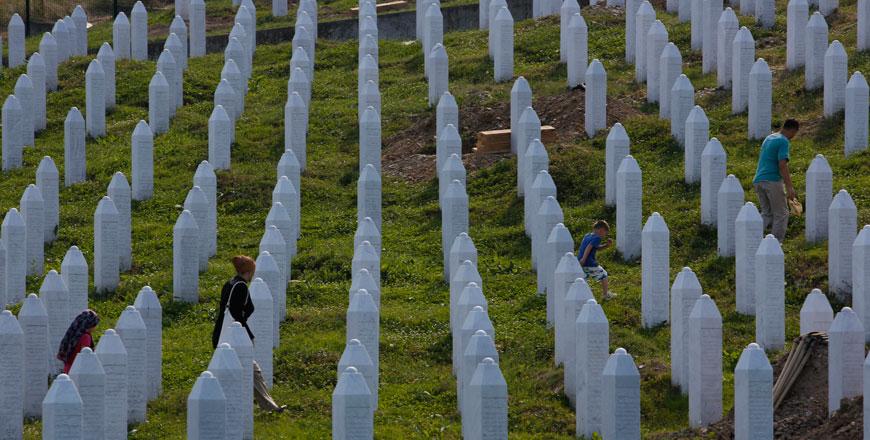You are here
Serbian PM forced to flee Srebrenica massacre memorial
By Reuters - Jul 11,2015 - Last updated at Jul 11,2015

A woman weeps as she visits the grave of a family member at the Potocari memorial complex near Srebrenica, 150 kilometres northeast of Sarajevo, on Saturday (AP photo)
POTOCARI, Bosnia and Herzegovina — Serbia's prime minister was forced to flee a ceremony held to mark 20 years since the Srebrenica massacre on Saturday, when mourners hurled stones and bottles at him in what his government later described as an attempted assassination.
Bodyguards surrounded Aleksandar Vucic and rushed him away through a crowd that turned on him moments after he entered the cemetery and laid flowers to 8,000 Muslim men and boys executed after the UN safe haven fell to Bosnian Serb forces towards the end of the 1992-95 war.
Stones and bottles were thrown from the crowd, some of whom were heard to cry "Allahu Akbar" (God is greatest), in an attack underscoring the depth of anger over Belgrade's denial of the massacre as genocide.
Serbia, which backed the Bosnian Serbs during the war with men and money, condemned the attack as an "assassination attempt".
Vucic, without his glasses that he said were smashed, told reporters in Belgrade: "It was not an incident. It was an organised attack."
The attendance of Vucic, a hardline nationalist during the Yugoslav wars but who now wants to take Serbia into the European Union, was intended to be symbolic of how far the region has come since the bloody collapse of Yugoslavia.
But it came just days after his government enlisted ally Russia to veto a resolution at the United Nations that would have condemned the denial of Srebrenica as genocide, as a UN court has ruled it was.
Many Serbs dispute the term, the death toll and the official account of events, reflecting conflicting narratives of Yugoslavia's collapse that still feed divisions and have stifled progress in Bosnia towards integration with western Europe.
As Vucic fled and calm was restored, the remains of 136 recently identified Muslim Bosniak victims were interred under bright blue skies, their coffins draped in green cloth and carried aloft by mourners. The bones of more than 1,000 are yet to be found.
Different future
Vucic had been welcomed by Munira Subasic, head of the Association of Srebrenica Mothers, who pinned to his lapel a green and white crochet flower, a symbol of Srebrenica.
In a book of condolences he wrote: "Here in Srebrenica, it is the obligation of each of us to bow our heads, to not forget and to begin to create a different future."
But in the cemetery, a banner quoted from a wartime address by Vucic to the Serbian parliament. "For every Serb killed, we will kill 100 Muslims," it read.
"I'm sorry some did not recognise my sincere desire to build friendship between Serbs and Bosniaks," Vucic said. "My hand remains outstretched to the Bosniak people."
Subasic said she was "terribly disappointed" by the scenes.
The EU and the United States condemned the attack, and Bosnia's tripartite presidency issued a statement expressing its "deepest regret", saying Vucic had come "in the spirit of reconciliation and with the intention of paying respects".
Serbia sent a protest note to Bosnia. "This was a murder attempt on Aleksandar Vucic," said Interior Minister Nebojsa Stefanovic.
Some 100,000 people died in the Bosnian war, before a US-brokered peace deal created a complex and unwieldy system of ethnic power-sharing that remains today and is frequently held hostage to nationalist politicking.
The accused architects of the massacre — Bosnian Serb wartime leader Radovan Karadzic and military commander Ratko Mladic — are standing trial at the UN court in The Hague, after years spent in hiding in Serbia.
Vucic lionised both men before rebranding himself in 2008 as a pro-Western reformer.
"Look at him and look at those thousands of tombstones," said Hamida Dzanovic, who had come to bury two bones identified by DNA as those of her missing husband. "Is he not ashamed to say that this was not genocide?"
Related Articles
SREBRENICA, Bosnia and Herzegovina — Bosnian Muslims marked the 25th anniversary of the Srebrenica massacre on Saturday, the worst atrocity
THE HAGUE — Former Bosnian Serb leader Radovan Karadzic was convicted by UN judges of genocide for the 1995 Srebrenica massacre, the worst w
UNITED NATIONS — Russia vetoed a United Nations Security Council resolution on Wednesday that would have condemned the Srebrenica massacre a
















